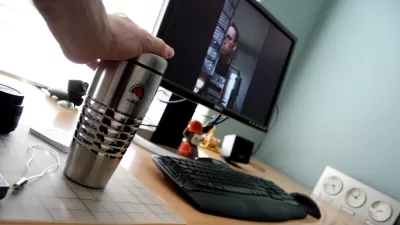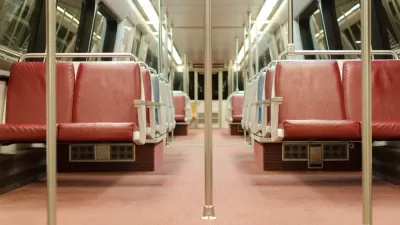In a pattern evident in communities all over the country, U.S. Census data shows more Americans are working from home. Researchers from the Brookings Institution are hoping that planners have noticed the trend.

"Over time, though, the American commute is shifting in increasingly novel ways, especially at the metropolitan level. Going back to 2000, many workers are opting out of traditional modes of transport like cars and switching to other modes," report Joseph Kane and Adie Tomer.
The most compelling evidence of the evolution of commute patterns, according to Kane and Tomer, is the "continued surge in remote working."
"From 2000 to 2014, nearly 2.4 million more people—or 13 percent of all new commuters—are working at home to bring their national total to 6.5 million. Moreover, the share of workers at home has risen from 3.2 percent to 4.5 percent, surpassing the rate of growth in all other commuting categories and building off a series of emerging work patterns in the public and private sector."
The post goes on to provide examples of some of the other ways commuting has changed in recent years, before concluding with an appeal to transportation and land use planners to take the shift into account.
FULL STORY: Since 2000, American commuters more likely to work from home or use alternate modes

Maui's Vacation Rental Debate Turns Ugly
Verbal attacks, misinformation campaigns and fistfights plague a high-stakes debate to convert thousands of vacation rentals into long-term housing.

Planetizen Federal Action Tracker
A weekly monitor of how Trump’s orders and actions are impacting planners and planning in America.

In Urban Planning, AI Prompting Could be the New Design Thinking
Creativity has long been key to great urban design. What if we see AI as our new creative partner?

King County Supportive Housing Program Offers Hope for Unhoused Residents
The county is taking a ‘Housing First’ approach that prioritizes getting people into housing, then offering wraparound supportive services.

Researchers Use AI to Get Clearer Picture of US Housing
Analysts are using artificial intelligence to supercharge their research by allowing them to comb through data faster. Though these AI tools can be error prone, they save time and housing researchers are optimistic about the future.

Making Shared Micromobility More Inclusive
Cities and shared mobility system operators can do more to include people with disabilities in planning and operations, per a new report.
Urban Design for Planners 1: Software Tools
This six-course series explores essential urban design concepts using open source software and equips planners with the tools they need to participate fully in the urban design process.
Planning for Universal Design
Learn the tools for implementing Universal Design in planning regulations.
planning NEXT
Appalachian Highlands Housing Partners
Mpact (founded as Rail~Volution)
City of Camden Redevelopment Agency
City of Astoria
City of Portland
City of Laramie





























